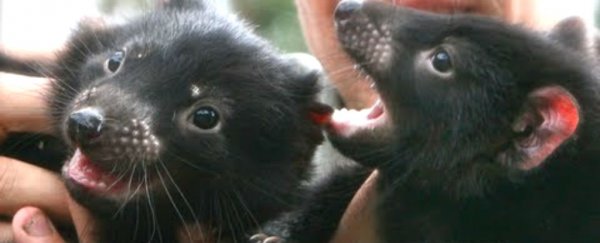Scientists have discovered that Tasmanian devil milk contains an arsenal of antimicrobial compounds that can kill some of the most deadly bacterial and fungal infections known to science - including golden staph.
Tasmanian devils were found to produce six different types of these antimicrobial compounds - humans produce just one - and scientists were able to successfully synthesise them in the lab to test their effectiveness against a number of drug-resistant bacterial and fungal pathogens.
When tested against 25 different bacterial and six fungal strains, the six varieties of antimicrobial compounds were found to kill golden staph (Staphylococcus aureus) - responsible for food poisoning, pneumonia, and toxic shock syndrome - and Enterococcus, which can cause urinary tract infections and meningitis.
The compounds also killed Candida krusei - a rare yeast species associated with high mortality - and the deadly and hyper-virulent airborne fungus called Cryptococcus gattii.
"It was really exciting," one of the team, Emma Peel from the University of Sydney in Australia, told Bridie Smith at The Sydney Morning Herald. "We showed that these devil peptides kill multi-drug resistant bacteria, which is really cool."
For the uninitiated, Tasmanian devils are a species of carnivorous marsupial found in the wild only on the Australian island state of Tasmania. Around the size of a small dog, they're the largest carnivorous marsupial in the world.
Tasmanian devils are currently under serious threat from devil facial tumour disease (DFTD) - a highly infectious parasitic facial cancer that's wiped out more than 70 percent of the species.
But while this disease has been wreaking havoc on the population over the past two decades, it appears the species is actually developing its own resistance to DFTD.
And that's not the only indication of this Australian species' incredible toughness - Tasmanian devil joeys are born without primary immune tissues, and they don't develop proper antibody-mediated immunity until around 90 days old. And yet, somehow they survive their mother's pouch, which is positively teeming with bacteria.
Researchers aren't entirely sure how tiny, weak babies with lacking immune systems can survive such an environment, but antimicrobial peptides in their mother's milk and pouch lining could be key.
When Peel and her team scanned the Tasmanian devil's genome and analysed the molecular structure of the milk, they found six naturally occurring antimicrobial peptides in the cathelicidins family that were "three to six times more effective" against a range of fungal infections than a common anti-fungal medication.
Two varieties of peptides - Saha-CATH5 and Saha-CATH6 - have been singled out for being particularly effective in killing bacteria that are harmful to humans.
"Of the six characterised cathelicidins, Saha-CATH5 and 6 have broad-spectrum antibacterial activity and are capable of killing problematic human pathogens," the team concludes.
With drug resistant infections expected to kill more people than cancer each year if things keep going as they are, we need a solution, and fast. The researchers are now investigating if the synthetic version of these peptides can be used safely in humans
"These peptides are killing superbugs, so there is potential for future development into antibiotics," Peel told ABC News.
"That is the next step for our research, to see if these peptides have anti-cancer potential, if they are killing superbugs maybe they could kill the facial tumour."
The study has been published in Scientific Reports.
